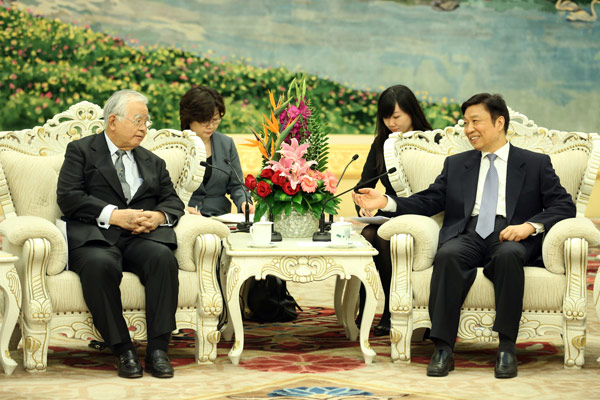Better relations sought with Japan
By ZHANG YUNBI (China Daily) Updated: 2014-05-29 02:13Proper treatment of historical issues is essential element, vice-president tells business delegation
 |
|
Vice-President Li Yuanchao (right) meets with Hiromasa Yonekura, chairman of the Japan Business Federation, at the Great Hall of the People in Beijing on Wednesday. WU ZHIYI / CHINA DAILY |
Vice-President Li Yuanchao hosted a group of prominent Japanese industrial figures on Wednesday and asked them to help improve strained relations between China and Japan.
Li met the business delegation led by Hiromasa Yonekura, chairman of the Japan Business Federation, in Beijing just days after the countries traded bitter exchanges. Last week, two Japanese military aircraft intruded into the airspace of China's East China Sea Air Defense Identification Zone during joint naval drills by China and Russia.
As close neighbors, the two nations should pursue "peace, friendship and cooperation", Li told Yonekura, a frequent visitor to China.
The two largest economies in Asia have seen their relationship strained over territorial and historical issues since September 2012, when the Japanese government unilaterally announced its decision to "nationalize" China's Diaoyu Islands in the East China Sea.
"An improvement in the China-Japan relationship requires a correct understanding and an appropriate treatment of historical issues, and the Diaoyu Islands," Li said.
Repairing the relationship also requires the Japanese to "observe China's development in a correct manner", Li added.
Yonekura said his federation will consistently devote efforts to normalize relations between the two countries.
Liu Jiangyong, deputy dean of the Institute of Modern International Relations at Tsinghua University, said the islands issue has been widely perceived as a "bottleneck".
"Things will get worse" if Japanese Prime Minister Shinzo Abe visits the Yasukuni Shrine in Tokyo — which honors 14 Class-A war criminals of World War II among other war dead — again later this year, Liu added.
Yonekura was part of a delegation in November of more than 100 leading Japanese entrepreneurs who visited China in search of business opportunities. During that trip, they met with Vice-Premier Wang Yang.
Ma Junwei, deputy director of the Institute of Japanese Studies at the China Institutes of Contemporary International Relations, said: "In contrast to the existing tensions over political and defense agendas, there are robust demands from both countries for more economic cooperation."
Tokyo Governor Yoichi Masuzoe visited Beijing in April and Masahiko Koumura, vice-president of Japan's ruling Liberal Democratic Party, led a delegation to China for a three-day visit in early May.
"Bilateral ties have suffered and the visiting delegations were trying to find out which field or dimension bears the best chance of a major breakthrough," Ma said.
Tadatomo Yoshida, president of Japan's Social Democratic Party, will lead his party delegation's visit to China in June. The group will include former Japanese prime minister Tomoiichi Murayama.
Banri Kaieda, president of the Democratic Party of Japan, plans to visit China in July, Japan's leading newspaper Sankei Shimbun reported on Wednesday.
zhangyunbi@chinadaily.com.cn
- More female officials caught in corruption
- Whampoa veterans recorded with glory
- Police bust 9 terrorist groups in Xinjiang
- Knife-wielding attackers seized in Xinjiang
- New regulation leads to drop in petitioned cases
- Hunan plant shut as probe into lead poisoning begins
- Police boost efforts to combat gambling
- Project offers jobs openings to legal experts
- Experts: Dog meat festival 'illegal'
- Nation looks to upgrade
pipeline networks






